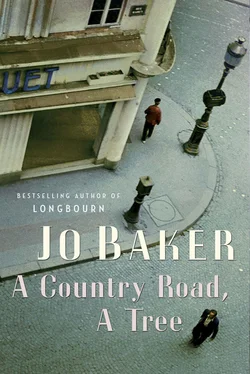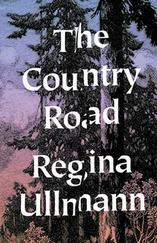No use whatsoever, Mother. No use to anyone at all.
He rounds the corner, teeth stinging, his jaw is clenched so tight. He blunders straight into another man.
A fumbled readjustment.
“Ah, excuse me—”
“Oh, hello—”
And it is Paul Léon himself, his light summer jacket neatly buttoned over a pristine shirt and a blue silk tie. He looks as though he has stepped straight out of those satellite years before the war.
“Paul.” They shake hands. “Thank God. I was just on my way to see you.” He touches Paul’s elbow, exerting gentle pressure, steering him away from the checkpoint.
They cross the road together and continue in the direction Paul had been going, but now on the far side of the street. They pass, with the expanse of cobblestones between them, the knot of soldiers and the young woman. She is really arguing now; her voice is shrill and insistent and the soldiers are getting fed up, shuffling; it’s not exciting now that she’s scolding them like a furious little sister. He sees the papers offered back and her grab them and stuff them away. She stalks off.
“I was worried, when I heard about the round-up,” he says.
Paul’s lips compress. “We plan to leave.”
“I’m sorry.”
“It’s not your fault, my friend. We’ll leave as soon as the boy’s got his bachot. ”
“When’s that?”
“Tomorrow.”
He nods. Good.
“Though I have to say, we’re not best pleased. Lucie particularly hates these déménagements. There is so much to organize, and it is so disruptive for the children, and for our work.”
“I know,” he says, though he knows he does not really know. Work is one thing, but children are entirely another. How one could look a life’s worth into the future and consider the prospect good enough to throw small people out to flounder round in it, to pin exams to them and think that it will matter. Instinct is powerful, he supposes. Blood and spunk and all of that, it pushes against sense. Love, perhaps.
“I still expect to see him,” Paul says.
It takes just a moment. “Do you?”
He tries to see Joyce here, now, a blind man with a stick, feeling his way along through Paris under occupation. Outraged at the inconvenience of it all.
“I knew he wasn’t well, but it just didn’t occur to me that he would die.”
“Fifty-eight,” he says. “It’s not old.”
“I thought maybe we would have another book from him,” Paul says.
“Really?” He can’t imagine what this book would be.
They approach the junction with the rue Littré. This is where Paul must turn, it seems, because he slows and offers out a hand.
“Ah well,” Paul says. “It’s good to see you, my friend.”
“Be careful,” he says. “Please.”
They clasp hands. Paul gives him a smile and turns away, and ambles off. The stooped pale shape diminishing down the dim street, under the grey August sky.
—
It is the fascination of disgust, the way his attention is fixed on her and her lips as they move. The disgust of the green and pink twist of mouse innards left on the doorstep, the slime-thick hair teased from the plughole, the way that nails sink into the flesh of an overlooked pear. The lips forming on the words: those sales métèques. With their dirt and disease and lice and their disease and their dirt and their scheming, and their insistence on being where they are not wanted, their insistence on just being.
He turns himself away, watches the posters as the wind tugs at their corners. The easy lines of a dancer’s leg, the yellow and blue of a southern beach. Fresher, more recent layers of the palimpsest: children clustered round a stolid man in uniform: Populations abandonnées faites confiance, it reads, au soldat allemand!
The queue shuffles itself forward. He turns his collar up against the wet and tugs his hat brim down and shuffles forward too. His boots are leaking, unrepaired; his feet squelch.
Look at us, mugs that we are, queuing for hours in the rain, and in August, would you believe it! Dreadful summer that it’s been. And even then the bread not what it was.
Sawdust in the flour, her friend says.
Chalk.
Bad year for the grain.
But in the camps, oh ho, they just get everything handed to them. Out at Drancy and at Royallieu. They don’t know how lucky they are: three meals a day, all the bread they want, nothing to worry about, not like us. They don’t know they’re born.
Bad year for the grain, in that all the grain has been carted off to Germany. Bad year for the potatoes. And for the wine. And for the coal. He has a choice, of course; he doesn’t have to stay and listen to this. He could just step out of the queue. He could just walk away. And he could have a good go at tearing that poster off the wall as he passes. He could just keep on walking, walking like he used to, the long miles winding into the mountains, the wide spread of silence, with its markers of distant birdcalls and a farm-dog’s bark and sometimes a solitary car, the wind in their ears and their feet planted one after the other on the macadam, and then gravel, and then narrow trails of worn earth. The escape up to where everything was fresh and clean and clear.
But now the war is everywhere and he cannot walk away.
And — this of course bears consideration — Suzanne will tear strips off him if he comes home without their bread.
So he turns aside, his back against the wall, and smokes a cigarette. He thinks, you shall find out how salt is the taste of another man’s bread, and how hard is the way up and down another man’s stairs.
Dante is a consolation.
—
“But. No.”
Suzanne’s lips are compressed and her face is tight with distress. She nods. It’s true.
“But how did it happen? When?”
“There was another round-up this morning. He must have thought it was safe to be out, that it was all over and done with. So many people must have thought as much.”
“Christ.” He sits down. “Where’ve they taken him?”
Suzanne shakes her head. “Drancy, maybe?”
The world can collapse to this. To the inside of a truck, rattling across the cobblestones of Paris. To the crowded precincts of a camp. To the locked door and the barbed wire coiled across the sky. And the vile ignorance of fellow citizens, who begrudge you even this.
“How’s Lucie?”
Just another shake of the head.
His jaw is tight, his teeth stinging. He can feel the pressure of Paul’s hand in his, the lightly worn intelligence, that civility. The stooped figure diminishing down the street. They can’t do this. How can they do this? It’s just ridiculous, to lock up Paul Léon. It is an outrage. He’s on his feet, rebuttoning the coat he hadn’t yet removed, and is heading for the door.
“Where are you going?” Suzanne blinks at him, her eyes big and wet.
“I’ll go and see Lucie.”
“What can you do?”
“I’ll find out.”
—
Lucie has been crying. Her eyes are puffy and her mouth is smudged, but her face has been washed and powdered and when she speaks her voice is careful and measured. She holds herself erect.
She does her best to smile. She ushers him into the apartment, offers him a seat, has nothing else to offer. The children are not at home. Whatever else they are denied, they are still obliged to go to school.
“I’m so sorry, Lucie.”
In the sunny room of Shakespeare and Company, years ago: she was on Paul’s arm, her belly huge under a blue coat, and they were talking with Sylvia, and Lucie had laughed, he remembers the sight of her, and she had seemed almost luminous then, extraordinary beside her gangling husband. She’s a journalist, Sylvia had informed him in one of her gossipy confidences after the couple had left; she’s on the Paris desk of the Herald Tribune. And the husband has a couple of books under his belt too. Now the woman is creased and dimmed, her mouth twisted to a knot. And then her face crumples and she buries it in her hands. He reaches out towards her, then stops short. He tucks his hands between his knees, looks up at the unbleached square on the wall where a painting used to hang.
Читать дальше










